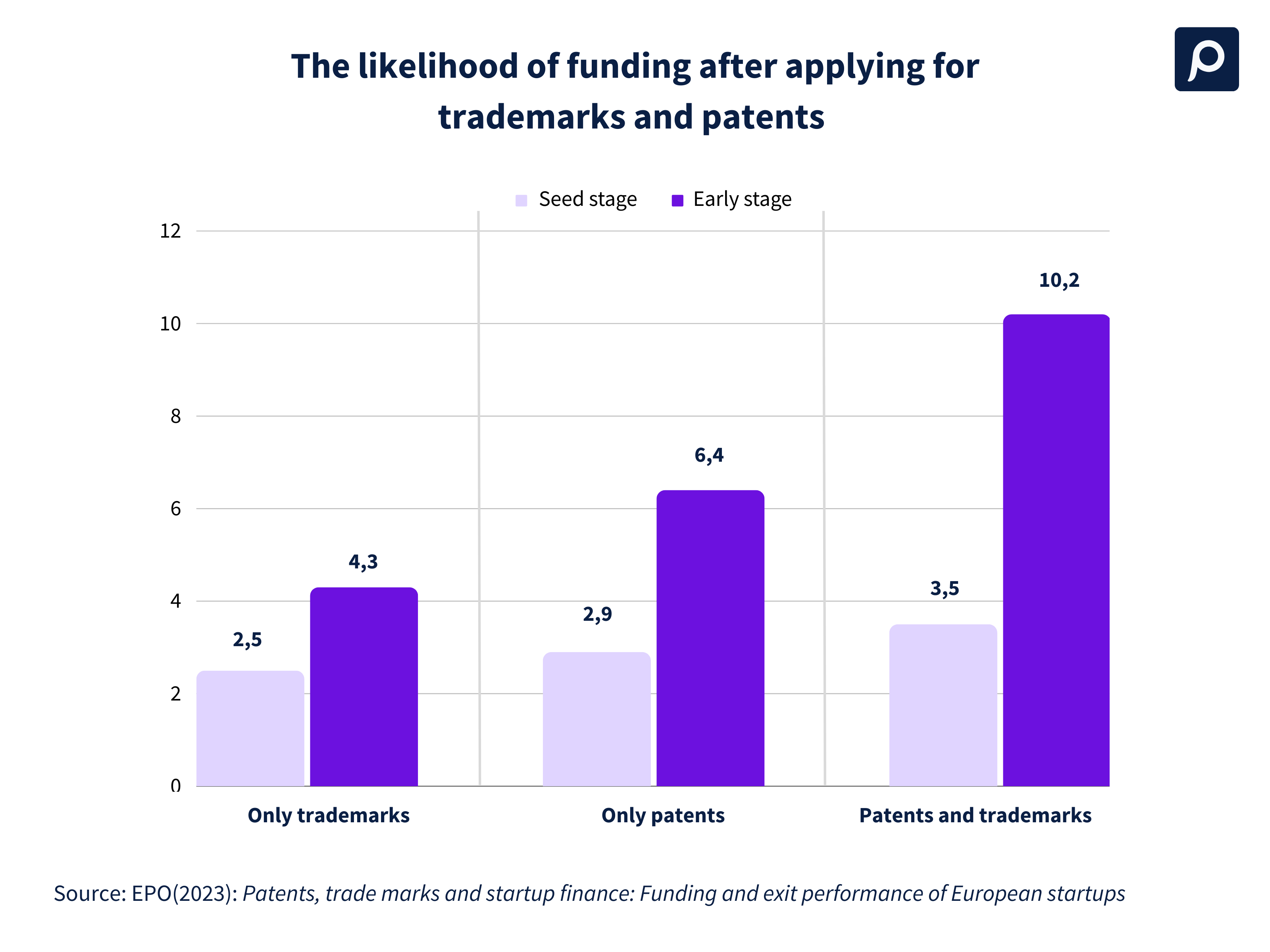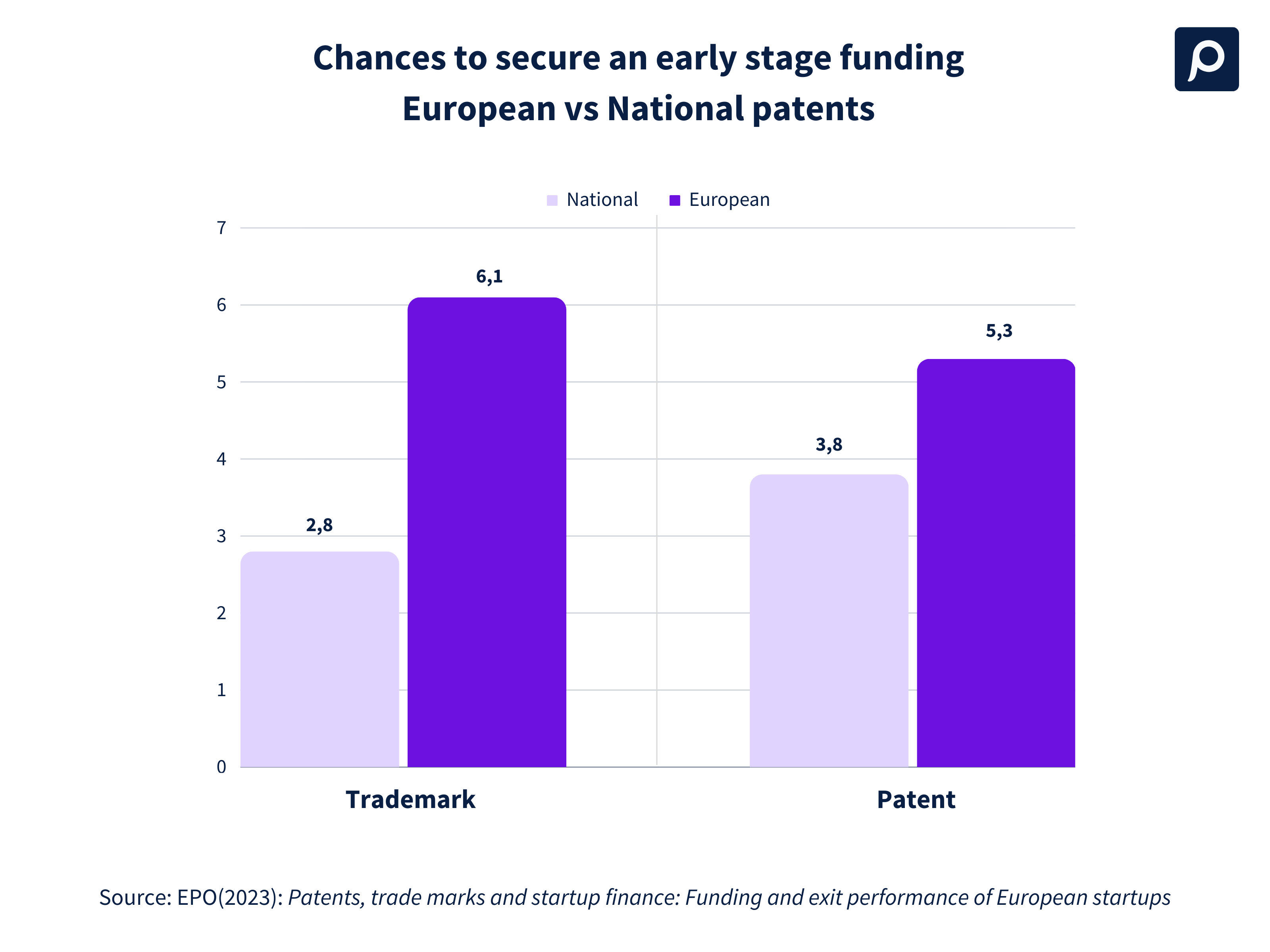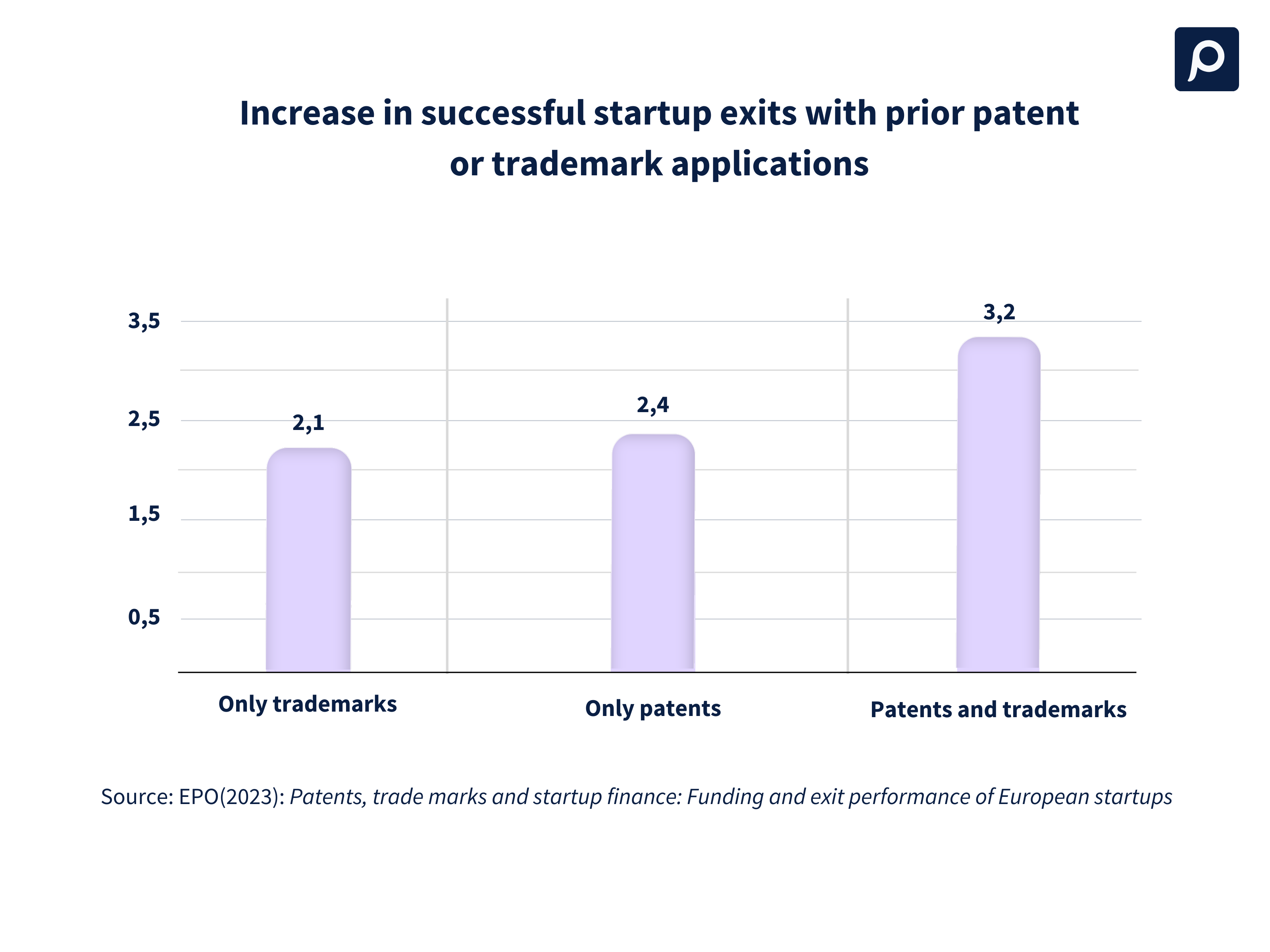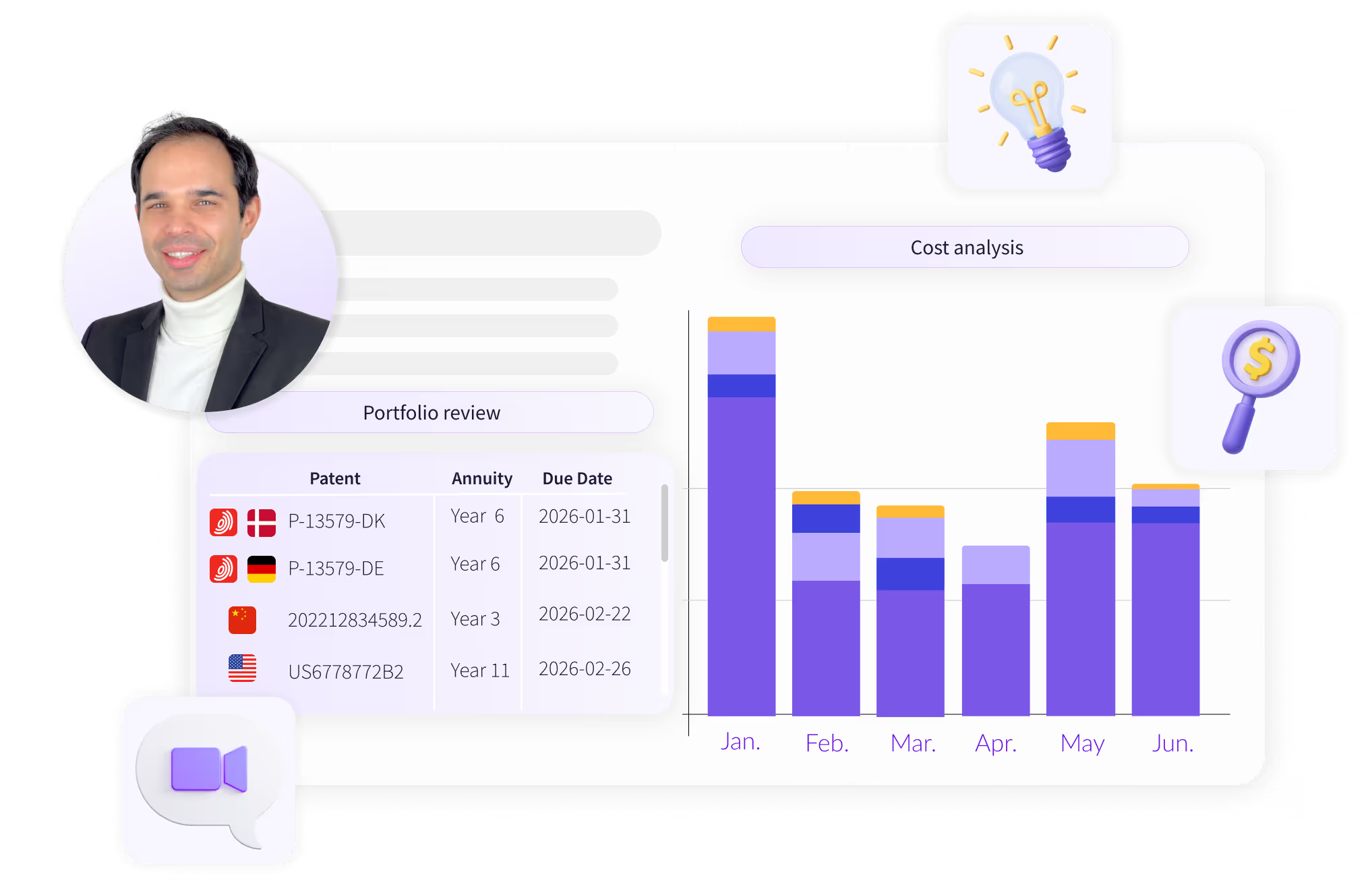TRY OUR NEW (FREE) IP RENEWAL COST CALCULATOR
Calculate
In the fast-paced startup world, the concrete benefits of intellectual property are becoming increasingly clear. For patent holders, it’s not just about protecting ideas, it’s about using them as a strategic tool to drive growth, secure funding, and gain a foothold in a tough marketplace.
Focusing on European startups, renowned for their innovation and role in boosting the economy, it’s important to zero in on what really propels their funding and success. At the core is intellectual property. This article will explore the direct advantages that IP rights offer to startups and highlight why patent owners need to be well-versed in these benefits.
Recent statistics reveal an intriguing growth pattern concerning Europe's startup ecosystem. The venture capital deal value notably escalated, increasing from EUR 9.4 billion in 2013 to an impressive EUR 110.8 billion in 2021. This significant uptick highlights the strengthening of Europe's venture capital industry, which is increasingly attracting international investors and catalyzing the European economy. The increasing focus on startups as key drivers of innovation, especially in fields like digitalization, sustainability, and industrial competitiveness, reflects this trend.
In their journey towards innovation, startups, often characterized by lean structures, confront a range of challenges. These include high-risk business models, limited access to capital markets, and the intangible nature of their assets, which frequently results in financial hurdles. Statistics suggest that only a fraction, approximately one in a thousand startups, manage to reach a successful financial exit, such as an initial public offering or high-value acquisition. These challenges highlight the important role of venture capital funds, which not only provide essential financial support but also offer invaluable management insights, effectively bridging a crucial information gap.
For most startups, their intellectual assets are crucial, often being their only resources in the early stages. The decisions made about these assets, which are protected by patents and trademarks, can really shape the startup's future.
Patents and trademarks are both vital for startups, but they affect different parts of the journey. Patents protect a startup's innovative technological solutions, ensuring that their unique ideas stay theirs. Trademarks, meanwhile, protect the startup's brand and reputation in the market. Together, they're a strong combination that helps startups thrive in the competitive business landscape.
European surveys consistently highlight 'commercial exploitation' and 'prevention of imitation' as the main reasons for patent filing. Well-managed intellectual property rights can also help with collaborations, licensing arrangements, and secure investments, crucial for startups with resource issues.
Intellectual property filings are increasingly popular in the startup world. On average, 29% of European startups have registered IP rights, but this percentage isn't consistent across all sectors. Biotechnology is at the forefront, with nearly half of its startups utilizing patents or registered trademarks. Other sectors with notable amounts of IP filings include science, engineering, healthcare, and manufacturing. It's also interesting to observe the higher reliance on trademarks in sectors where IP rights are less common, in contrast to technology-focused startups that tend to lean more on patents.
Recent studies indicate that intellectual property rights play a significant role in a startup's ability to attract funding. Being public indicators of a startup's technological and marketing expertise, these IP rights help bridge the knowledge gap between entrepreneurs and potential investors.
To venture capital managers, such rights signal a startup's potential value, assisting them in navigating the uncertainties of startup investments. Notably, startups with granted patents show a 55% increase in employment and an 80% increase in sales after five years of receiving the patent. Essentially, holding key IP rights enhances a startup's negotiating power and provides easier access to crucial financial resources.
As startups progress, their engagement with IP rights becomes more pronounced. At the initial seed funding stage, around 10% of supported startups file for a patent, a figure that increases to 44% in later funding rounds. The trend for trademarks is similar. An important observation is the dominance of European IP rights at all stages: 80% of seed-stage startups with a patent opt for a European patent application. This highlights the significance of European IP rights in the global startup space.
Delving deeper into the nuances of IP, European rights emerge as a formidable factor. Data suggests a correlation between startups with registered IP rights and their propensity to attract VC funding.
Startups in their early growth stage, which have filed for trademarks, are 4.3 times more likely to get VC backing. Those who've filed for patents have a 6.4 times higher likelihood. And when a startup combines both, the odds are even higher.
In the seed stage, the tendencies are similar, with at least 2.5 times higher probability of receiving funding with applications to registered IP rights.

The emphasis on European IP rights isn't just a trend; it's a concrete strategy that has been recognized and endorsed by both startups and investors.
Startups with an EU trademark application are 6.1 times more likely to secure early-stage funding compared to 2.8 times for counterparts who've only filed for a national trademark. When it comes to startups with European patent applications, they are 5.3 times more likely to receive the same as opposed to only 3.8 times for those who only have national patent applications.

The journey of a startup doesn't end with obtaining VC funding. A successful exit, either with an Initial Public Offering (IPO) or acquisition, is often the final prize. Here too, IP rights play a decisive role. Startups with both patent and trademark applications under their belt exhibit the highest likelihood of a successful exit. If we look at startups that applied for specifically European IP rights, the chance of a successful end to their journey is even higher.

In the unpredictable environment of startups, intellectual property is an asset clearly guiding them towards success. For patent owners, this isn't just data – it's an insight into the importance of IP rights in the startup realm. As these startups excel towards innovation, growth, and success, their IP strategy will invariably determine their trajectory.
In conclusion, intellectual property rights are becoming more and more valuable in the startup ecosystem, especially in Europe. As startups continue to drive innovation and reshape industries, understanding the importance of patents and trademarks becomes essential. For every entrepreneur and investor, recognizing the value of intellectual property could be the cornerstone of future success.
If you're intrigued by these findings and as a patent owner yourself, wish to delve deeper into efficient IP renewals, consider booking a meeting with our experts or requesting a price comparison.
Source: European Patent Office (2023). Patents, trade marks and startup finance. [Accessed 8 Nov. 2023].
Interested in a free IP renewal consultation? Benchmark your current IP renewal setup and costs against market standards.
